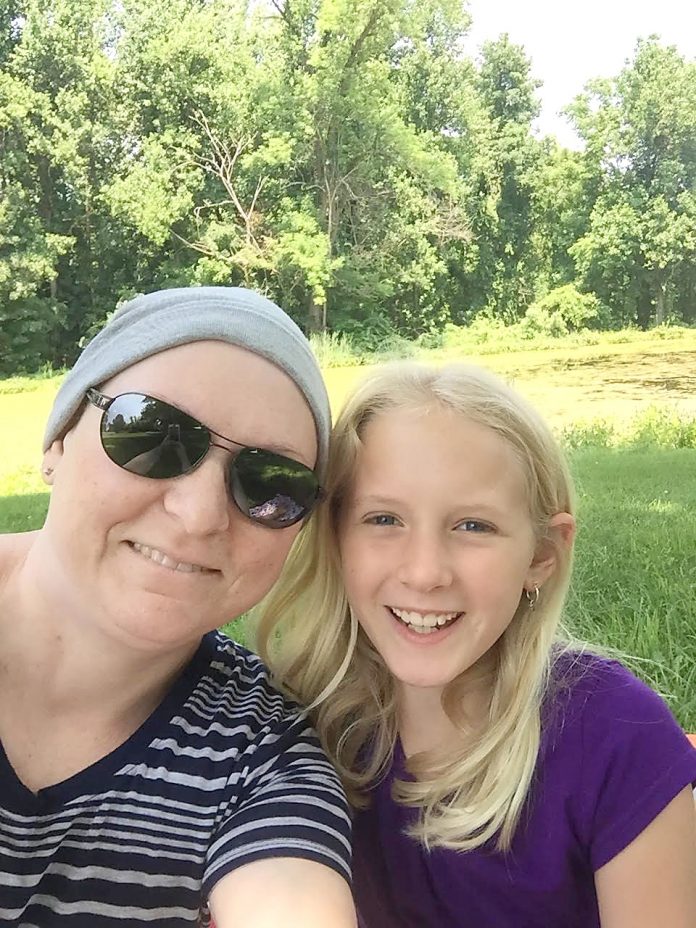An ongoing battle: Melissa Kartasevich was diagnosed with pancreatic cancer in 2013. With the help of her daughter, Sarah, and her husband Dennis, she continues to battle the disease, and the rising costs associated with it. SOURCE: FOX CHASE CANCER CENTER
For more than three years, Melissa Kartasevich has been in a fight for her life against the nation’s second-leading killer, but cancer isn’t the only challenge facing the Fox Chase native and patients like her.
They also have to fight for access to cutting edge medications — treatments that one might think should be readily available to citizens of the wealthiest country on Earth. On June 29, patient access to clinical trials was one of the primary topics of discussion during a regional Cancer Moonshot Summit at Fox Chase Cancer Center.
Co-presented by the federal Department of Health and Human Services and the American Cancer Society, the FCCC event was one of about 270 similar forums held across the nation that morning featuring a keynote address by Vice President Joe Biden via a live-streamed video feed.
President Barack Obama launched the Cancer Moonshot program in January as an effort to accelerate research into new treatments. Biden, whose son Beau died of complications from brain cancer at age 46 last year, is directing the program. The name hearkens to President John F. Kennedy’s May 25, 1961, address to Congress in which he first vowed to land a man on the Moon by the end of the decade.
In his summit comments, Biden called on the medical research community to “make a decade’s worth of progress in the next five years. I believe we can make exponential progress.”
At Fox Chase, the vice president had a riveted audience of dozens of physicians, researchers, cancer center administrators, advocates and patients, who took part in panel discussions examining the importance of basic research, the sharing of data (or lack thereof) among advanced researchers, as well as clinical trials and patient advocacy. Dr. Richard Fisher, the president and CEO of FCCC, noted that less than 10 percent of cancer patients are taking part in clinical trials.
Kartasevich, 41, is among the 10 percent. She had been engaged to her future husband Dennis for about a week and had just purchased a house in Langhorne when doctors diagnosed her with pancreatic cancer in May 2013. Her daughter Sarah was 6.
The first sign of trouble was a pain in her side when she awoke one day. By lunchtime, her condition wasn’t improving. Over-the-counter painkillers weren’t helping. By 7 p.m., she was at Jeanes Hospital, an acute-care community hospital sharing a campus with FCCC. Both institutions are affiliated with Temple Health. Doctors diagnosed blood clotting in her spleen, but the cause remained a mystery, even after five days of inpatient testing. She would later learn that her type of cancer is one of the most difficult to detect.
Finally, an ultrasound exam exposed cancerous masses.
“My initial reaction was I just cried,” Kartasevich said. “Once I got that out of the way, I knew I had to take care of it.”
The five-year survival rate for those with pancreatic cancer is about 5 percent.
The Cancer Society projects that about 42,000 Americans will die from the disease this year, making it the third-deadliest form of cancer. According to Kartasevich, pancreatic cancer recently surpassed breast cancer in that dubious category.
“We’re the only cancer with a survival rate in the single digits,” she said. “And we’re the most underfunded.
“I had one friend who said, ‘Don’t Google it because it’s not good.’ And I didn’t, my first time around.”
Kartasevich’s early discovery of the disease and her age have worked in her favor. She was at Stage II. Many afflicted don’t recognize symptoms until later stages.
Her early treatments included daily radiation sessions for six weeks and weekly chemotherapy treatments, then more aggressive chemo for four months. In subsequent surgery, doctors removed her spleen and 75 percent of her pancreas, an organ critical for digestion and the production of insulin. As a result, Kartasevich is now diabetic.
She was declared in remission for “a little bit,” but earlier this year, doctors discovered cysts on her uterus and fallopian tube. She underwent more surgery and is now in a clinical trial. As of late last month, her “tumor number markers” had declined by about 50 percent. That’s a good sign.
“I’m using a drug to test how it works with pancreatic cancer and I’m using it with another proven cancer drug,” Kartasevich said.
The clinical trial means she’s taking a medication that is still being tested in accordance with federal protocols. It hasn’t been approved for widespread production. That means Kartasevich is part patient and part science project, subject to a lot more blood testing and monitoring. But she’s all in for it.
“(My family) is very proud of me. I don’t know how I can do it sometimes. But going through this has made me a stronger person than I’d ever be,” she said. “My daughter’s been a big help. She’s only 9, but she’s what keeps me going.”
On top of her own struggles, Kartasevich struggles for other cancer sufferers. In June, she traveled to Washington, D.C., for the Pancreatic Cancer Action Network’s Advocacy Day. About 700 people from 48 states, including 104 survivors, gathered to meet each other and public officials while learning how to be advocates in their own communities.
On Nov. 5, Kartasevich will take part in PurpleStride, a 5K run and family fun walk in Fairmount Park to benefit pancreatic cancer causes. To join her or help out, visit PurpleStride.org and search for her team, “Melissa’s Pancreatic Cancer Crushers,” on the Philadelphia event page. ••





